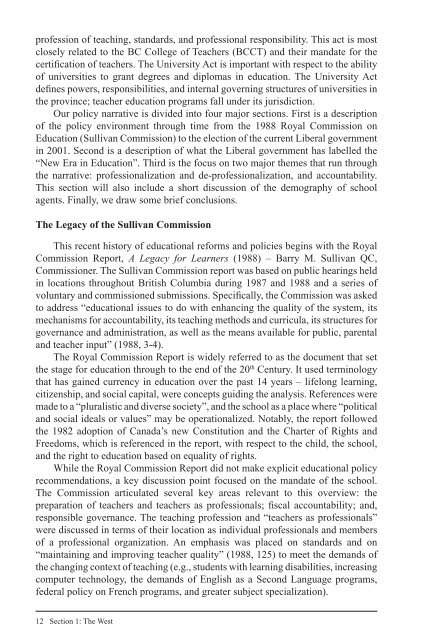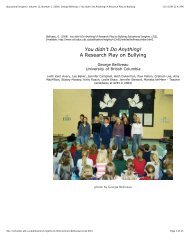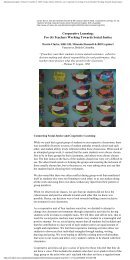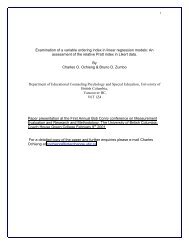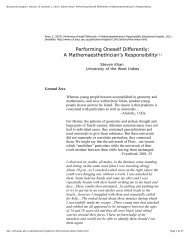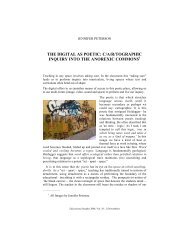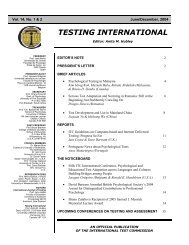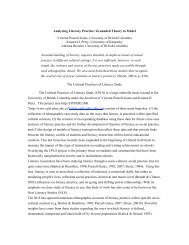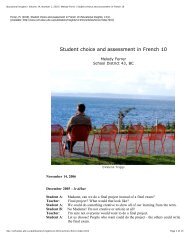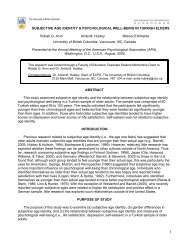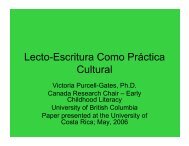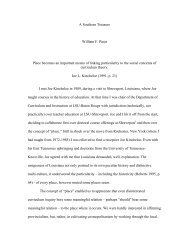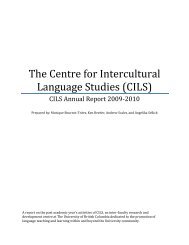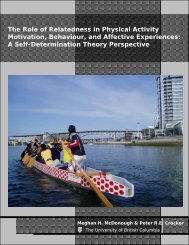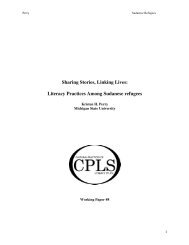The evolution of professionalism - Centre for Policy Studies in ...
The evolution of professionalism - Centre for Policy Studies in ...
The evolution of professionalism - Centre for Policy Studies in ...
Create successful ePaper yourself
Turn your PDF publications into a flip-book with our unique Google optimized e-Paper software.
pr<strong>of</strong>ession <strong>of</strong> teach<strong>in</strong>g, standards, and pr<strong>of</strong>essional responsibility. This act is most<br />
closely related to the BC College <strong>of</strong> Teachers (BCCT) and their mandate <strong>for</strong> the<br />
certifi cation <strong>of</strong> teachers. <strong>The</strong> University Act is important with respect to the ability<br />
<strong>of</strong> universities to grant degrees and diplomas <strong>in</strong> education. <strong>The</strong> University Act<br />
defi nes powers, responsibilities, and <strong>in</strong>ternal govern<strong>in</strong>g structures <strong>of</strong> universities <strong>in</strong><br />
the prov<strong>in</strong>ce; teacher education programs fall under its jurisdiction.<br />
Our policy narrative is divided <strong>in</strong>to four major sections. First is a description<br />
<strong>of</strong> the policy environment through time from the 1988 Royal Commission on<br />
Education (Sullivan Commission) to the election <strong>of</strong> the current Liberal government<br />
<strong>in</strong> 2001. Second is a description <strong>of</strong> what the Liberal government has labelled the<br />
“New Era <strong>in</strong> Education”. Third is the focus on two major themes that run through<br />
the narrative: pr<strong>of</strong>essionalization and de-pr<strong>of</strong>essionalization, and accountability.<br />
This section will also <strong>in</strong>clude a short discussion <strong>of</strong> the demography <strong>of</strong> school<br />
agents. F<strong>in</strong>ally, we draw some brief conclusions.<br />
<strong>The</strong> Legacy <strong>of</strong> the Sullivan Commission<br />
This recent history <strong>of</strong> educational re<strong>for</strong>ms and policies beg<strong>in</strong>s with the Royal<br />
Commission Report, A Legacy <strong>for</strong> Learners (1988) – Barry M. Sullivan QC,<br />
Commissioner. <strong>The</strong> Sullivan Commission report was based on public hear<strong>in</strong>gs held<br />
<strong>in</strong> locations throughout British Columbia dur<strong>in</strong>g 1987 and 1988 and a series <strong>of</strong><br />
voluntary and commissioned submissions. Specifi cally, the Commission was asked<br />
to address “educational issues to do with enhanc<strong>in</strong>g the quality <strong>of</strong> the system, its<br />
mechanisms <strong>for</strong> accountability, its teach<strong>in</strong>g methods and curricula, its structures <strong>for</strong><br />
governance and adm<strong>in</strong>istration, as well as the means available <strong>for</strong> public, parental<br />
and teacher <strong>in</strong>put” (1988, 3-4).<br />
<strong>The</strong> Royal Commission Report is widely referred to as the document that set<br />
the stage <strong>for</strong> education through to the end <strong>of</strong> the 20 th Century. It used term<strong>in</strong>ology<br />
that has ga<strong>in</strong>ed currency <strong>in</strong> education over the past 14 years – lifelong learn<strong>in</strong>g,<br />
citizenship, and social capital, were concepts guid<strong>in</strong>g the analysis. References were<br />
made to a “pluralistic and diverse society”, and the school as a place where “political<br />
and social ideals or values” may be operationalized. Notably, the report followed<br />
the 1982 adoption <strong>of</strong> Canada’s new Constitution and the Charter <strong>of</strong> Rights and<br />
Freedoms, which is referenced <strong>in</strong> the report, with respect to the child, the school,<br />
and the right to education based on equality <strong>of</strong> rights.<br />
While the Royal Commission Report did not make explicit educational policy<br />
recommendations, a key discussion po<strong>in</strong>t focused on the mandate <strong>of</strong> the school.<br />
<strong>The</strong> Commission articulated several key areas relevant to this overview: the<br />
preparation <strong>of</strong> teachers and teachers as pr<strong>of</strong>essionals; fi scal accountability; and,<br />
responsible governance. <strong>The</strong> teach<strong>in</strong>g pr<strong>of</strong>ession and “teachers as pr<strong>of</strong>essionals”<br />
were discussed <strong>in</strong> terms <strong>of</strong> their location as <strong>in</strong>dividual pr<strong>of</strong>essionals and members<br />
<strong>of</strong> a pr<strong>of</strong>essional organization. An emphasis was placed on standards and on<br />
“ma<strong>in</strong>ta<strong>in</strong><strong>in</strong>g and improv<strong>in</strong>g teacher quality” (1988, 125) to meet the demands <strong>of</strong><br />
the chang<strong>in</strong>g context <strong>of</strong> teach<strong>in</strong>g (e.g., students with learn<strong>in</strong>g disabilities, <strong>in</strong>creas<strong>in</strong>g<br />
computer technology, the demands <strong>of</strong> English as a Second Language programs,<br />
federal policy on French programs, and greater subject specialization).<br />
12 Section 1: <strong>The</strong> West


